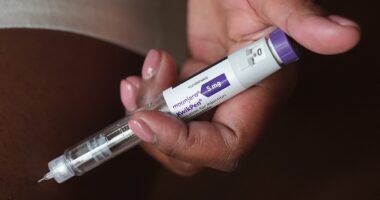Share this @internewscast.com
When Alice Mika was bitten by a mosquito last summer in Melbourne’s west, she didn’t think anything of it.
Then, a small raised bump appeared on her ankle more than five months later and wouldn’t go away. She saw her GP who prescribed antibiotics, believing it to be a spider bite.
But over the course of two months, “it was just getting worse and worse”, she said. Her ankle began to swell and the scab of the bite eventually erupted into a gaping hole exposing the layer of fat beneath the skin.
Mika’s doctors initially didn’t think she could have the flesh-eating Buruli ulcer because she told them she hadn’t visited Victoria’s Bellarine Peninsula, one of the coastal areas where the disease was thought to be confined, which also includes the Mornington Peninsula.
However in recent years it has spread. Since 2019, there have been cases reported in the suburbs of Geelong and inner Melbourne areas, including Essendon, Moonee Ponds and Brunswick West.
The Victorian government last week announced a record 363 cases were reported in 2023, adding to the exponential increase over the past two decades since 12 were reported in 2003.
Yet how Australians are ending up with these skin ulcers has been a mystery ever since Australian scientists discovered this bacterium more than 80 years ago, said Prof Tim Stinear, the director of the World Health Organization Collaborating Centre for Mycobacterium Ulcerans at the Doherty Institute.
But now research led by Stinear, published Wednesday in Nature Microbiology, claims to have solved the “transmission enigma” with evidence that mosquito bites are spreading the infection between possums and humans.
“The research is building on decades of research where we’ve had an inkling that mosquitoes are involved in spreading this infection, but we’ve been met with a lot of scepticism in the field because it’s unprecedented for this type of bacteria to be spread by mosquitoes,” Stinear said.
The researchers trapped and tested more than 65,000 mosquitoes between 2016 and 2021 in the Mornington Peninsula, which is known to have one of the highest incidences of Buruli ulcer in the world, and built a “hierarchy of evidence” demonstrating the insects are responsible for spreading the infection, Stinear said.

Using forensic level genomics, the researchers found the bacteria in the mosquitoes was an identical match to the bacteria in the people.
They also sequenced the DNA in the blood in the mosquitoes’ abdomens and found the insects had fed on both Australian native possums and humans.
The researchers also carried out a spatial mapping and statistical analysis of the areas where people were getting Buruli ulcer, where possums were carrying the bacteria, shedding it in their faecal pellets, and where mosquitoes were also carrying the bacteria, and found that those areas overlap in space.
Prof Rhonda Stuart, the director of Public Health and Infection Prevention at Monash Health, said “it’s a really significant paper. It fills in the gaps of things we’ve been wanting to know about Buruli ulcer for many years, and the link between human disease, possums and mosquitoes as the probable vectors of transmission.”
after newsletter promotion
Stuart said increasing mosquito prevalence as a result of torrential rain could be among the factors contributing to the spread of the Buruli ulcer.
“We’ve seen it with Japanese encephalitis last summer, where normally Japanese encephalitis mosquitoes were only up north, and then we’ve seen them further down as far as southern New South Wales and northern Victoria,” Stuart said.
Stinear hopes the research’s findings will lead to better control of this infection, including greater awareness of how individuals can prevent mosquito bites, stopping mosquitoes breeding around homes and public health measures.
The infection has a very long incubation period, Stinear warned. From the time that you get bitten by the mosquito to the time symptoms begin to appear, starting with a bite or pimple that doesn’t heal, is usually about four to five months, he said.
“It can be painless, so people ignore it and eventually, the skin breaks down, and you are left with an ulcer, but actually beneath the skin is lots of dead and dying tissue that the victim is unaware of.”
If a GP can diagnose Buruli ulcer early, a PCR test can quickly confirm the infection and specific antibiotics that will effectively treat it.
The infection is not lethal but if left untreated people are left with lesions that can affect quality of life during treatment, and afterwards when they’re left with a lifelong disfigurement or disability, Stinear said.
Mika said her ulcer is healing and “heading in the right direction”.
“Hindsight is 2020. GPs can’t know everything but it’s a shame that they weren’t aware [the disease] was in Melbourne – it might have been diagnosed sooner.”















